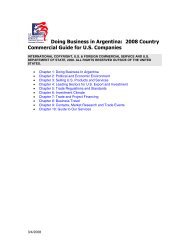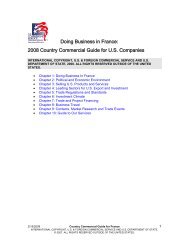Doing Business In Saudi Arabia - Bna
Doing Business In Saudi Arabia - Bna
Doing Business In Saudi Arabia - Bna
You also want an ePaper? Increase the reach of your titles
YUMPU automatically turns print PDFs into web optimized ePapers that Google loves.
Under existing procedures, business visitors typically receive short duration, singleentry<br />
visas.<br />
Right to Private Ownership and Establishment Return to top<br />
Domestic private entities have the right to establish and own business enterprises and<br />
engage in all forms of remunerative activity. Private entities generally have the right to<br />
freely establish, acquire, and dispose of interests in business enterprises. Certain<br />
activities are reserved for state monopolies and <strong>Saudi</strong> citizens.<br />
Protection of Property Rights Return to top<br />
The <strong>Saudi</strong> legal system protects and facilitates acquisition and disposition of private<br />
property, consistent with Islamic practice respecting private property. Non-<strong>Saudi</strong><br />
corporate entities are allowed to purchase real estate in <strong>Saudi</strong> <strong>Arabia</strong> according to the<br />
new foreign investment code. Other foreign-owned corporate and personal property is<br />
protected, and the Embassy knows of no cases of government expropriation or<br />
nationalization of U.S.-owned assets in the Kingdom. <strong>Saudi</strong> <strong>Arabia</strong> does have a<br />
system of recording security interests.<br />
<strong>Saudi</strong> <strong>Arabia</strong> recently undertook a comprehensive revision of its laws covering<br />
intellectual property rights to bring them in line with the WTO agreement on Trade<br />
Related Aspects of <strong>In</strong>tellectual Property Rights (TRIPs). The <strong>Saudi</strong> Government<br />
undertook the revisions as part of <strong>Saudi</strong> <strong>Arabia</strong>'s accession to the WTO, and<br />
promulgated them in coordination with the World <strong>In</strong>tellectual Property Organization<br />
(WIPO). The <strong>Saudi</strong> Government recently updated their Trademark Law (2002),<br />
Copyright Law (2003), and Patent Law (2004) with the dual goals of TRIPs-compliance<br />
and effective deterrence against violators.<br />
The current Law on Patents, Layout Designs of <strong>In</strong>tegrated Circuits, Plant Varieties and<br />
<strong>In</strong>dustrial Designs has been in effect since September 2004. Largely due to a lack of<br />
adequate resources and technical expertise, when this law went into effect the patent<br />
office had issued slightly more than 40 patents and had a large backlog of more than<br />
9,000 applications dating back to issuance of <strong>Saudi</strong> <strong>Arabia</strong>’s first patent law in 1989.<br />
The office has streamlined its procedures, hired more staff and reduced the backlog.<br />
Protection is available for product and product-by-process. The term of protection was<br />
increased from 15 years to 20 years under the new law, but patent holders can no<br />
longer apply for a routinely granted five-year extension.<br />
An unknown number of pharmaceutical products lost patent protection when <strong>Saudi</strong><br />
<strong>Arabia</strong> transitioned to a new TRIPS-compliant patent law in 2004. Products that had<br />
applications for patents pending under the old law (and enjoyed patent protection while<br />
their applications were pending) were reviewed as new cases under the new law.<br />
These products were then denied patents because it was determined that they were<br />
not "novel" because they had been publicly patented in other jurisdictions more than a<br />
year before their cases were considered in <strong>Saudi</strong> <strong>Arabia</strong>.<br />
5/13/2008












